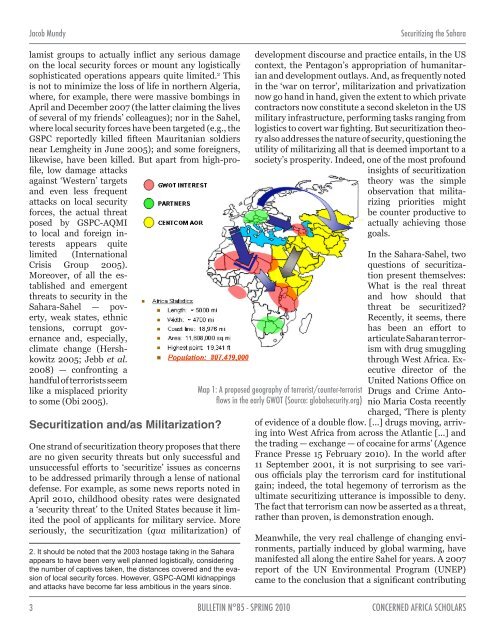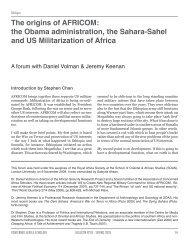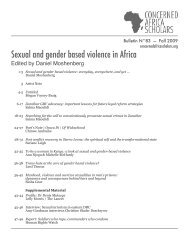Western Sahara and the United States' geographical imaginings
Western Sahara and the United States' geographical imaginings
Western Sahara and the United States' geographical imaginings
Create successful ePaper yourself
Turn your PDF publications into a flip-book with our unique Google optimized e-Paper software.
Jacob Mundy Securitizing <strong>the</strong> <strong>Sahara</strong><br />
lamist groups to actually inflict any serious damage<br />
on <strong>the</strong> local security forces or mount any logistically<br />
sophisticated operations appears quite limited. 2 This<br />
is not to minimize <strong>the</strong> loss of life in nor<strong>the</strong>rn Algeria,<br />
where, for example, <strong>the</strong>re were massive bombings in<br />
April <strong>and</strong> December 2007 (<strong>the</strong> latter claiming <strong>the</strong> lives<br />
of several of my friends’ colleagues); nor in <strong>the</strong> Sahel,<br />
where local security forces have been targeted (e.g., <strong>the</strong><br />
GSPC reportedly killed fifteen Mauritanian soldiers<br />
near Lemgheity in June 2005); <strong>and</strong> some foreigners,<br />
likewise, have been killed. But apart from high-profile,<br />
low damage attacks<br />
against ‘<strong>Western</strong>’ targets<br />
<strong>and</strong> even less frequent<br />
attacks on local security<br />
forces, <strong>the</strong> actual threat<br />
posed by GSPC-AQMI<br />
to local <strong>and</strong> foreign interests<br />
appears quite<br />
limited (International<br />
Crisis Group 2005).<br />
Moreover, of all <strong>the</strong> established<br />
<strong>and</strong> emergent<br />
threats to security in <strong>the</strong><br />
<strong>Sahara</strong>-Sahel — poverty,<br />
weak states, ethnic<br />
tensions, corrupt governance<br />
<strong>and</strong>, especially,<br />
climate change (Hershkowitz<br />
2005; Jebb et al.<br />
2008) — confronting a<br />
h<strong>and</strong>ful of terrorists seem<br />
like a misplaced priority<br />
to some (Obi 2005).<br />
Securitization <strong>and</strong>/as Militarization?<br />
One str<strong>and</strong> of securitization <strong>the</strong>ory proposes that <strong>the</strong>re<br />
are no given security threats but only successful <strong>and</strong><br />
unsuccessful efforts to ‘securitize’ issues as concerns<br />
to be addressed primarily through a lense of national<br />
defense. For example, as some news reports noted in<br />
April 2010, childhood obesity rates were designated<br />
a ‘security threat’ to <strong>the</strong> <strong>United</strong> States because it limited<br />
<strong>the</strong> pool of applicants for military service. More<br />
seriously, <strong>the</strong> securitization (qua militarization) of<br />
. I� �������� b�� ������ ����� ����� 003 ���������� ��k��� �� ����� S������<br />
�pp������ �� ���v�� b����� v���y w���� p������� ������������y, �������������<br />
����� ��mb��� �� ��p��v���� ��k���, ����� ������������ ��v������ ��� ����� ��v��<br />
����� �� ����� ���������y ��������. H�w��v���, GSPC�A�MI k����pp�����<br />
��� �����k�� ���v�� b����m�� ��� ������� �mb������� �� ����� y������ �������.<br />
BULLETIN N°85 - SPRING 2010<br />
development discourse <strong>and</strong> practice entails, in <strong>the</strong> US<br />
context, <strong>the</strong> Pentagon’s appropriation of humanitarian<br />
<strong>and</strong> development outlays. And, as frequently noted<br />
in <strong>the</strong> ‘war on terror’, militarization <strong>and</strong> privatization<br />
now go h<strong>and</strong> in h<strong>and</strong>, given <strong>the</strong> extent to which private<br />
contractors now constitute a second skeleton in <strong>the</strong> US<br />
military infrastructure, performing tasks ranging from<br />
logistics to covert war fighting. But securitization <strong>the</strong>ory<br />
also addresses <strong>the</strong> nature of security, questioning <strong>the</strong><br />
utility of militarizing all that is deemed important to a<br />
society’s prosperity. Indeed, one of <strong>the</strong> most profound<br />
insights of securitization<br />
<strong>the</strong>ory was <strong>the</strong> simple<br />
observation that militarizing<br />
priorities might<br />
be counter productive to<br />
actually achieving those<br />
goals.<br />
In <strong>the</strong> <strong>Sahara</strong>-Sahel, two<br />
questions of securitization<br />
present <strong>the</strong>mselves:<br />
What is <strong>the</strong> real threat<br />
<strong>and</strong> how should that<br />
threat be securitized?<br />
Recently, it seems, <strong>the</strong>re<br />
has been an effort to<br />
articulate <strong>Sahara</strong>n terrorism<br />
with drug smuggling<br />
through West Africa. Executive<br />
director of <strong>the</strong><br />
<strong>United</strong> Nations Office on<br />
Drugs <strong>and</strong> Crime Antonio<br />
Maria Costa recently<br />
charged, ‘There is plenty<br />
of evidence of a double flow. [...] drugs moving, arriving<br />
into West Africa from across <strong>the</strong> Atlantic [...] <strong>and</strong><br />
<strong>the</strong> trading — exchange — of cocaine for arms’ (Agence<br />
France Presse 15 February 2010). In <strong>the</strong> world after<br />
11 September 2001, it is not surprising to see various<br />
officials play <strong>the</strong> terrorism card for institutional<br />
gain; indeed, <strong>the</strong> total hegemony of terrorism as <strong>the</strong><br />
ultimate securitizing utterance is impossible to deny.<br />
The fact that terrorism can now be asserted as a threat,<br />
ra<strong>the</strong>r than proven, is demonstration enough.<br />
Map 1: A proposed geography of terrorist/counter-terrorist<br />
flows in <strong>the</strong> early GWOT (Source: globalsecurity.org)<br />
Meanwhile, <strong>the</strong> very real challenge of changing environments,<br />
partially induced by global warming, have<br />
manifested all along <strong>the</strong> entire Sahel for years. A 2007<br />
report of <strong>the</strong> UN Environmental Program (UNEP)<br />
came to <strong>the</strong> conclusion that a significant contributing<br />
CONCERNED AFRICA SCHOLARS




